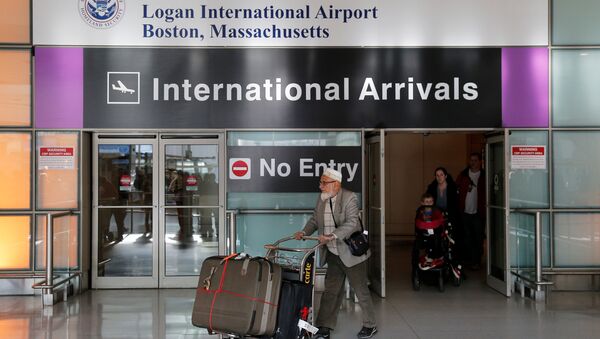The Trump administration on Tuesday said it plans to add seven more countries to its travel ban list: Belarus, Eritrea, Kyrgyzstan, Myanmar, Nigeria, Sudan and Tanzania. According to reports, not all of the countries would face blanket bans on US travel, as some could have restrictions placed on certain visa types, including business or visitor visas. Trump on Tuesday also told the Wall Street Journal that he would make an announcement regarding the ban by the end of the month.
“Belarus is one of the few counties on this new expanded list that has a relatively small percentage of Muslims, but you know, Sudan, Nigeria, Kyrgyzstan all have sizable Muslim populations,” Kazi told Loud & Clear hosts John Kiriakou and Brian Becker on Wednesday.
“There is something kind of poetic here. This expanded list corresponds to the third anniversary of Trump's initial executive order that came to be known as the Muslim ban. So, here we are, toward the end of Trump's first term, and he’s reminding us that a cornerstone of his presidential term has been a kind of explicit racial xenophobia. And that’s included in Islamophobia, and it’s also included a type of racism against migrants from Latin America, Central America, and so here he is, kind of continuing that,” Kazi noted.
Kazi noted that each US president in the 21st century has had their own “signature Islamaphobic moves.”
“For [former US President] George W. Bush, we might think about the Patriot Act or the establishment of a detention center at Guantanamo Bay; for [former US] President [Barack] Obama, we can think about the Countering Violent Extremism program or his program of targeted killings as his signature Islamaphobic measure; and for Donald Trump, his signature Islamaphobic measure has been the travel ban. He campaigned on it, he enacted it as one of his first acts after inauguration … and now he’s revisiting it,” she noted.
“And I think it might be useful for us to think about what Trump is doing - and these other measures of Islamophobia that other presidents have enacted - more as Islamodiversion, as opposed to Islamophobia. So, in other words, we can think about it as: what is it we are being distracted from every time a US president enacts a form of Islamophobia?”
On January 27, 2017, one week after taking office, Trump first introduced an executive order prohibiting entry into the US of foreign nationals from seven Muslim-majority countries, although court challenges forced the administration to modify the ban multiple times. The current version of the executive order, also referred to as travel ban 3.0, bars travelers from five Muslim-majority nations — Iran, Libya, Somalia, Syria and Yemen — in addition to North Korea and Venezuela, Sputnik reported.
“What we call Islamaphobia have these tentacles that reach well beyond just Muslim populations. It’s been a fear of Muslims that have been used to justify militarizing the US-Mexico border,” Kazi pointed out, referencing rhetoric that alleges a weak southern border would allow organizations like Daesh or al-Qaeda to easily access the US.
“I think it’s really interesting, for instance, that counterterror organizations known as TigerSwan was used to crack down on Native American protesters at Standing Rock. So here you have something was that ostensibly designed to fight Islamist terrorists used against indigenous people of color here in the US,” she noted.
“We have to be very nuanced in understanding these ‘anti-terror’ measures … when we think about the list of countries and the fact that Venezuela and North Korea were kind of tacked on to make it look less like a Muslim ban,” Kazi continued. “But when we actually look at the numbers a few years into the first travel ban, it shows that pretty much entirely Muslims were impacted by this ban.”

